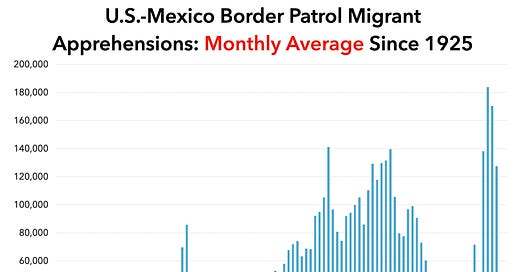Immigration
President Trump ended temporary protective status for 300,000 Haitians who have lived in the U.S. since 2010. It would be worth studying how many of these people who were too afraid for their safety to move back to Haiti have visited their native country in the last 15 years to see friends and family. So far this term, President Trump has ended TPS for migrants from Haiti, Venezuela, Cameroon, Afghanistan, and Nepal. (The Washington Post)
A letter was published by the Department of Justice calling on attorneys in the department to institute civil proceedings to revoke a person’s United States citizenship if an individual either “illegally procured” naturalization or procured naturalization by “concealment of a material fact or by willful misrepresentation.” The memo claims such efforts will focus on those who are involved “in the commission of war crimes, extrajudicial killings, or other serious human rights abuses … [and] naturalized criminals, gang members, or, indeed, any individuals convicted of crimes who pose an ongoing threat to the US”. The directive gives Justice Department attorneys wider discretion on when to pursue denaturalization, including in instances of lying on immigration forms, cases involving financial or medical fraud against the US or private individuals, and cases referred by a US attorney’s office or in connection with pending criminal charges. (The Guardian)
The Supreme Court ruled in a 7-2 decision that the Trump Administration had the authority to deport eight men to South Sudan. (Politico)
Colorado, along with 19 other states, sued the federal government to prevent Medicaid data from being used for immigration enforcement. “There’s no reason to share this sensitive data with immigration or law enforcement agencies. We’re suing to protect Colorado’s Medicaid program and the health and welfare of the people it serves,” Colorado Attorney General Phil Weiser said in a statement. (Denver Post)
The number of migrants apprehended at the southern border hit a new low, with just 6,000 attempting to cross into the United States. (CBS News)
Economy
Since President Trump's return to the White House, all of the U.S. job gains have gone to native-born workers, while the foreign-born workforce has declined by 543,000. The number of people employed by the federal government has shrunk by an estimated 60,000 jobs. Native-born workers gained 830,000 jobs, while foreign-born workers lost 348,000 in June. (Reuters)
Despite a growing job market, manufacturing employment continued to decline for a third consecutive month in June, with a contraction of 7,000 jobs. Declining global demand and interest rate pressure were considered the two key driving forces. (Ainvest)
The unemployment rate for teens has reached 13.4 percent, and the number of new summer jobs for 16- to 19-year-olds is expected to be the lowest since 2010. A drop in tourism and economic uncertainty has hit teens the hardest. (The New York Times)
Tech
Microsoft announced that it would be terminating four percent of its global workforce as it ramped up investments in artificial intelligence. Yet, as they laid off 2,300 workers in Washington State, they applied for 4,712 H-1b visas in fiscal year 2025. In the 2024 fiscal year, 9,491 H1-B visa applications were filed, and almost all were approved. (Daily Mail)
Meta and OpenAI are engaged in a talent war over the artificial intelligence race, with Meta offering researchers tens of millions of dollars. One researcher declined an $18 million annual paycheck to work for an AI startup. (Tech Crunch)
Education
A lesser-discussed provision of the “Big Beautiful Bill” was a national voucher program that allows parents who earn up to 300 percent of their area’s median income to qualify for the nation’s first voucher system. The program, however, is limited to states that choose to opt in, allowing liberal states beholden to the teachers’ union from entering the program. The program relies on U.S. taxpayers to make donations to nonprofits in exchange for a credit on their federal tax bills. In turn, the nonprofits grant scholarships to students. (The New York Times)





